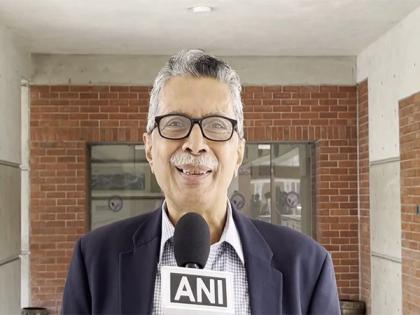Business between India and Bangladesh should run on merit: BEI President Humayun Kabir
By ANI | Updated: April 18, 2025 18:47 IST2025-04-18T18:41:44+5:302025-04-18T18:47:02+5:30
Dhaka [Bangladesh], April 18 : Business between India and Bangladesh should be based on merit and strength, said M. ...

Business between India and Bangladesh should run on merit: BEI President Humayun Kabir
Dhaka [Bangladesh], April 18 : Business between India and Bangladesh should be based on merit and strength, said M. Humayun Kabir, President of the Bangladesh Enterprise Institute (BEI), during the Foreign Service Day celebrations in Dhaka on Friday. BEI is a leading think tank in Bangladesh.
Foreign Service Day in Bangladesh is celebrated every year on April 18. The day marks the historic moment in 1971 when Bangladeshi diplomats and staff took over the Pakistan Deputy High Commission's office in Kolkata, establishing the first Bangladesh mission abroad. It is also a day to honour the brave diplomats and remember the 3 million people who were killed during the 1971 genocide.
"Well, that was a fiery time. We were all in the field just to gear up for our long liberation struggle. At that time, I recall on the 18th of April 1971, Hossain Ali raised the Bangladeshi flag and declared that the deputy high commission is Bangladesh's property. It represents Bangladesh. That really was a great energiser for all of us," said Kabir, who is also a former Bangladeshi ambassador and a freedom fighter.
"The announcement that came on the 18th, the deputy high commissioner expressed allegiance to the Bangladesh government, which was a big energy and subsequently also from Delhi, our former senior colleague K M Shihab Uddin and Amzadul Haq, both of them also came out, and that gave us a great degree of strength. We then realised our liberation war is getting global attention," he said.
"We set up the Mujibnagar government on the 17th of April, and the Indian government extended support. During our entire liberation war, the Indian government was very helpful. I myself was trained in Dehradun as a freedom fighter. We wanted to be independent, and India gave us a helping hand. We appreciate that and we recognise the Indian contributions for their support in our great liberation war," the BEI President added.
When asked about Bangladesh's growing relations with China and Pakistan, Kabir said, "We are just trying to normalise. Our relations with India are one track, our relations with China are on another track... Each relation is different. I don't believe Bangladesh has done anything that can make India concerned."
"Business should be allowed with its own merit and strengths. If politics get into it, that affects everybody. I think the suspension of transhipment or the suspension of import through the land boundary, neither of them will benefit anybody. Trade relations should continue as it is. It should be driven by and governed by the economic interest of both the country," he said.
Regarding the meeting between Indian Prime Minister Narendra Modi and Bangladesh's Chief Adviser Muhammad Yunus in Bangkok on the sidelines of the BIMSTEC summit, Kabir said, "India has grown, Bangladesh has grown, we have become mature. Now we are trying to recalibrate our relationship as Professor Yunus, our Chief Adviser, has mentioned that we want to maintain the relationship with India and any other country based on equality and dignity. We are working with India just to take the relationship forward. I hope it would be better for India to appreciate the changes that have taken place in Bangladesh after the July revolution of 2024. The people of Bangladesh are now more energetic. They want to be treated with dignity," he said.
"We want to work with India. In fact, we look at the economic relationship between Bangladesh and India as smooth and fine. At the political level, there was some understanding gap. But I hope that since we are neighbours, interdependent with each other, it would be better to normalise the relationship. Because at the end of the day, we have to work with each other. The sooner we understand that, the sooner we become positive, which would be helpful for both sides," Kabir added.
On the issue of repatriating former Bangladesh Prime Minister Sheikh Hasina, Kabir said, "This is an issue, and the Bangladesh government has formally requested India for her repatriation. India has not yet given a decision. They must be working on it. I hope soon we will find a mutually satisfying outcome."
Addressing India's concern over the treatment of minorities in Bangladesh, Kabir said, "There is a new realisation in Bangladesh that we all should live together as dignified members of the community. You have seen that the government, civil society, and political parties all stood guard to protect the lives and properties of the minority communities, and I don't believe that at this time anything can make anybody concerned. I must also say that this is continuous work. We have to continue working to ensure everybody in Bangladesh, including the minorities, is safe and they can continue their normal life."
Disclaimer: This post has been auto-published from an agency feed without any modifications to the text and has not been reviewed by an editor
Open in app